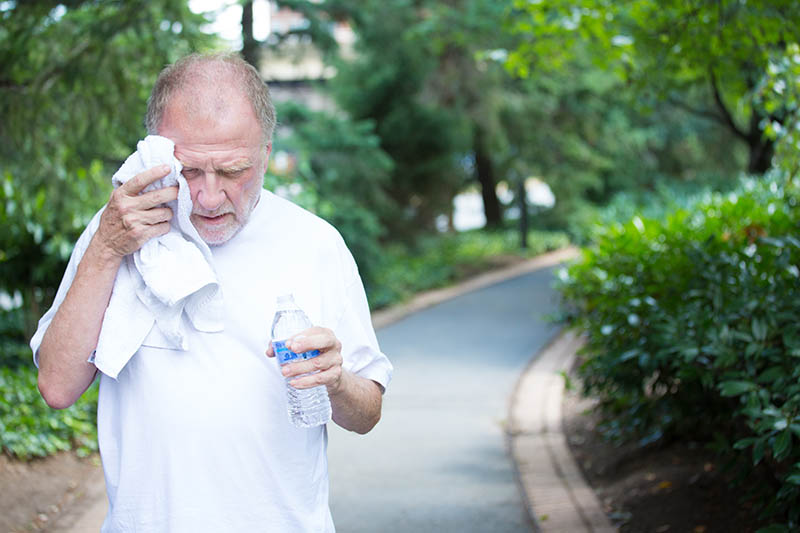Updated June 2025
In June, 2025, record-shattering heat waves swept into parts of the US., baking the Plains to the east coast of the US., with mercury heating up into triple digits. Early estimates pegged 147 million would be sweltering in very dangerous conditions.
Nor are other parts of the country immune, as last year’s deadly heat wave in Palm Springs, CA reached 124 degrees, in Las Vegas, 120, and Death Valley at 129 degrees demonstrated. Weather forecasters expect that trend to continue..
What does heat do to the body? It turns dangerous– with is a big impact on health.
Aging in a Hot Climate
As people grow older, their bodies change in ways that might enhance the risk of health problems caused by hot weather. Blood flow in skin tends to decrease as age increases. Skin blood flow is vital to the body’s ability to regulate its temperature.
Perspiration is essential to the regulation of body temperature. As the body ages, sweat glands become less efficient, impairing the body’s ability to cool itself. Some medications, including diuretics, sedatives, and some heart and blood pressure drugs, also reduce sweating.
The heart works harder to send more blood to the skin on hot and humid days. The extra strain on the heart may cause problems for seniors who suffer from heart disease.
Older people have an elevated risk of developing hyperthermia during hot summer months. Hyperthermia refers to a constellation of heat-related illnesses, including “heat stroke, heat edema (swelling in your ankles and feet when you get hot), heat syncope (sudden dizziness after exercising in the heat), heat cramps, and heat exhaustion.”
Tips for Staying Cool on Hot Days
How can seniors beat the heat? By heeding these tips, perhaps with the gentle encouragement of younger family members.
Stay hydrated. Perspiration helps the body stay cool, but the water the body loses in sweat needs to be replaced. Unfortunately, thirst diminishes with age. One study suggests that 40% of elderly people may be chronically underhydrated. Drinking water, juice, and other liquids is important, but seniors can also boost their hydration by eating water-rich foods with every meal. Cucumbers, watermelon, lettuce, strawberries, tomatoes, and celery add to the body’s water supply. Since alcohol and (to a lesser extent) coffee are diuretics, limiting their consumption in hot weather is also helpful.
Stay in air-conditioned buildings. While air conditioning runs up electric bills, electric fans are less likely to cool the body. Fans may even increase body temperatures in a dry heat. If you don’t have air conditioning, visit a mall or library. Some senior centers and social services organizations make cooling centers available when heat advisories have been issued.
Don’t use your oven. Stoves and ovens add heat to the kitchen. Consider salads, soups, and no-cook summer recipes on hot days.
Take a cool shower or bath if you feel overheated.
Wear loose, lightweight clothing. If you need to go outside in the hot sun, wear lighter colors. They reflect sunlight while darker colors absorb heat.
Watch for symptoms of heat stroke. People who suffer from heat stroke may not know what is wrong. Friends and family members should be prepared to call for immediate medical assistance if they see the symptoms of heat stroke, including fainting, confusion or combativeness, staggering, flushed and dry skin, or a strong, rapid pulse.
This article was reviewed June, 2025 since it was originally published July, 2022.
